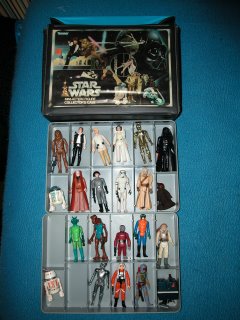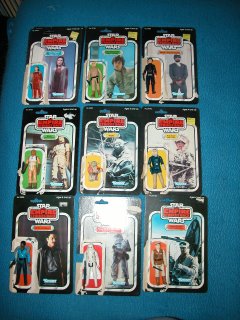Our nation turns its lonely eyes to you.
Uh, right. Maybe not. But I couldn't resist the "Mrs. Robinson" reference. (No reason for it, btw. Bullock is 2 1/2 years older than I am.)
Sorry to have left and gone away (hey hey hey) without explanation. I've just been in one of those "don't-feel-like-blogging" modes again, in part because I lead a dull, dull life at the moment. [ETA: Came home from the office today and Bullock said, "Sorry you're so bored, honey." (He reads the blog.) So I feel I need to say that I'm not at all bored. But my life doesn't make for very exciting blogging because things are too darn normal and contentment doesn't make for good narrative.] It's not like I've been terribly busy (not like the school year, anyway) but I've been getting back into work, and since I didn't work at all the first two months of summer (mourning + moving = Dr. Virago not getting any work done) there's been a little bit of urgency to this last month of summer. (Can you believe we start August 21? Ugh!) And I'm actually accomplishing some things (see ye olde Random Bullet Points of Crap below).
But it hasn't been all work. Not that I'm up to much that's exciting, but there has been some rest and relaxation. And lots of TV and movies. Lots. Huge quantities.
So, without further ado, I give you Random Bullet Points of Crap: How Dr. Virago spend her remaining summer vacation. Here's what I've been doing:
- Editing an article that has been accepted for publication! Woo-hoo! It's just a pedagogical piece, but it was peer-reviewed, so at my university, that counts as much as any other peer-reviewed piece. And the reviews were glowing! Yay me! Because I was mixing contemporary pop culture and medieval literature, one of my readers compared me favorably to story of St. Aldhelm on the bridge, who allegedly dressed in the guise of a minstrel and recited popular poetry to the people to get their attention before wowing them with his sermons. Read more about him here. Anyway, the edits are all in the nature of tracking down citations that I was a wee bit sloppy with in the first version (missing page numbers and the like) -- always a tedious but necessary task.
- Writing an application for an NEH Summer Stipend. At this point it's still the internal stage -- you must be nominated by your university and each university may only submit two candidates. I did this before and was nominated by Rust Belt U., but alas, I failed to receive a stipend. I have a good idea why: the project was in its most amorphous beginning stages and I really couldn't write convincingly about what I was doing with it. Now I've done a lot more research and I'm proposing what's necessary to complete an article (including manuscript and archival research in England -- which is what I really need the funding for), not to begin some vague book project. I think the NEH will prefer something more concrete like that to the rather fuzzy project of two years ago. But now I have to convince my U. that I'm worth betting on again.
- At the same time, because it's related to this application, I've been drafting what I'd write as my part of a proposal for a volume of essays, to which this article would be a contribution. (Wow, that was an ugly sentence.) And yes, I've mentioned this proposed collection in my internal application (and will probably mention it in the NEH version, too) so that my U. will see that this really isn't some vague project, but a concrete and short-term project with real prospects of publication.
- Writing two encyclopedia articles. I know, I know, they're not worth much professionally. But I consider it a favor to a friend. Plus, one of them I can write in my sleep. The other is a little hard because it's really a topic defined by the criticism and not the literature, but the title of the entry is "X Subject in Medieval Literature" so I'm having a harder time with it. And the hardest thing about both entries is the conservative (small "c") nature of the genre. Dealing with organization and categorization for the one I can write in my sleep is a bit of a bitch because the categories by which one might expect to see it organized are the ones I strongly question. It's all reminding me of an essay we had to do for freshman composition way back in the last century. Our teacher asked us to categorize the people on our dorm floor. Of course no one wanted to use demographic categories like race, national origin, religion, or socio-economic background, because we were all idealistic college students. But also, how useful were those categories to us? (The best essay, btw, came from a guy who categorized people by their treatment of him -- it ended with the category "Just Jerks.") Well, anyway, the categories I could use are kind of like those demographic categories -- obvious, conventional, but questionable in their usefulness in this particular situation. But then again, an encyclopedia entry isn't the place to be innovative. Argh!
- Watching a lot of DVDs from Netflix on the almost-as-good-as-a-movie-screen tv here at the homestead with Bullock. (Wait, I take that back. Sometimes it's *better* to watch movies on our tv than at the theaters in Rust Belt, since some of them are managed by the idiots who turn down the project bulbs under the false impression that that will save them electricity rather than just ruin the movie's visuals.) Among the movies Bullock and I have watched are:
- Seven Up! and 7 Plus Seven. I can't wait to see the 21, 35, 42, and 49 installments. If you don't know these films, they're quasi-ethnographic documentaries of 14 English children from different socio-economic backgrounds, who are interviewed at ages 7, 14, 21, 35, 42, and, recently, 49, to see where they end up. When they started the project, in 1964, they chose these kids because they wanted a glimpse of England in the year 2000. I'm really curious to see if the class differences really did make their mark on these people's lives, since I think of England in 2000 as a very different world from England in 1964. I mean, I imagine the rather rotten rich girl who lives on a 4,000 acre estate will probably still be rotten at ages 21, 35, and 42, and still have all her privileges, but I wonder if the lives of those from lower and middle classes will have merged more, especially since some of them are going to similar state schools, and they may wind up at the same universities as the public school boys. In other words, I wonder how much education will be a leveler (or not). I'm also fascinated by how much all the kids at ages 14 already seem like characters out of 19th century novels. Some of them are aware of this, too. The public school boys, in particular, are worried about being portrayed as stereotypes. (For the record, though, the three of them have very different personalities and politics, at least at age 14.) Anyway, if you have seen this series, don't give anything away in the comments!
- Spellbound. Clearly I'm on a documentary kick, as well as a charming kids kick. (Next on my Netflix queue, in the charming kids category, Truffaut's Small Change, aka L'argent de poche, one of my favorite movies of all time, but which Bullock hasn't seen.) Although Bullock kept mocking the uselessness of spelling bees as actual education (and he has a point, unless the kids are also studying how language works at the same time) I was really moved by a lot of these kids. And who knew how exciting the competition could be to watch! I actually had nail imprints in my palms from the clenching anxiety some of those kids provoked.
- Millions. Yes, more charming kids, this time fictional ones in a kind of magic realism setting a la Danny Boyle. (Who knew Danny Boyle could do a family film!) If I ever do a class on hagiography, I'm ending with this movie. Seriously! I loved, loved, loved the quirky takes on the visions of the saints and the boy's obsessive, almost statistical-minded, memory of each of them and their lives. In fact, this movie might also pair well with Margery Kempe as a way into discussing her homely imitation of the saints and saintliness. In fact, the more I think about it, the more I think this movie would be *great* with Kempe. After all, Damian annoys his brother Anthony with his wish to give the money to the poor and do good deeds almost as much as Margery annoys the people around her. And the domestic is such an important part of both texts. Brilliant!
- Napoleon Dynamite. No charming kids here! Finally got around to seeing this, and while I didn't love it, I liked it. I found it an interesting take on the teen movie genre. What happens if your geeky hero actually *is* a geek, it seemed to ask -- as opposed to the Hollywood version of a geek, which usually means Molly Ringwald or Lindsay Lohan or the male equivalent. The result? Well, it took me longer to warm up to Napoleon and then I felt kind of guilty for taking so long. And then I got mad at the movie for making me feel guilty. And then I started saying "Dang!" a lot.
- Watching a lot of TV. What's that you say? Nothing's on? Not so! Basic and premium cable got wise and launched a lot of interesting stuff while the networks were running crap reality tv and reruns. Here's what we're watching:
- Deadwood. Best. Western. Ever. Need I say more?
- Lucky Louie. If you haven't seen this, you must. If you don't have HBO, get the DVDs when they come out. It took us a couple of episodes to 'get it,' but after that we realized that this is a brilliant take on the conventional sitcom formula. The conventions are all there, only for the first time, because it's HBO at 10:30 p.m., the people are saying the kinds of things they'd say in real life (fully foul-mouthed, as befits HBO) and you're seeing much more than you'd see on a network sitcom. And there's no warm and fuzzy resolution. And can I just say how refreshing it is to see real people again on TV. It reminds me of what an impact Roseanne made.
- Hex. BBC America's very witchy take on the teen drama. The usual hotties are there, but now they're involved with demons, witches, a colonial and slave-owning past, and a snarky lesbian ghost. Not quite Buffy, but good stuff.
- Eureka. Still warming up to this new SciFi show, but it has potential.
- Life on Mars. Loved, loved, loved the first episode of BBC America's existentialist science-fiction-meets-hard-boiled-police-procedural-meets-nostalgia-for-the-seventies new series. Seriously, they couldn't have made a more perfect show for me and Bullock. He loves sci fi. I love hard boiled detective fiction. And we both love the "is it real or is it all in your head" trope.












